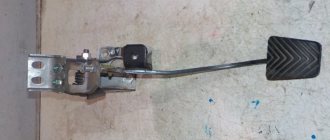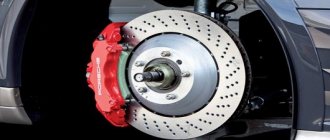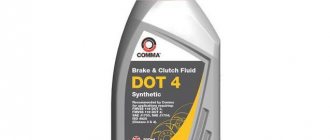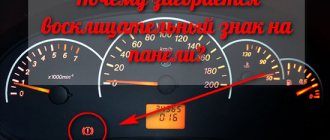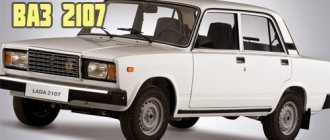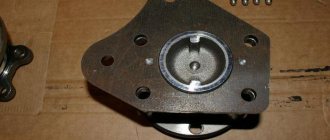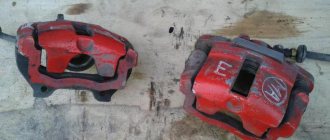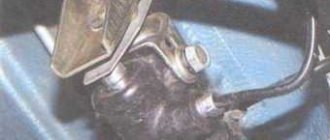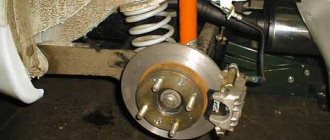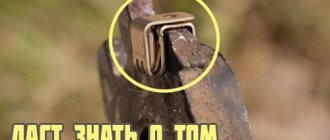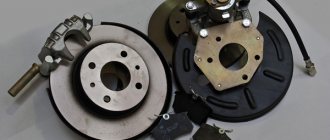Why do brakes squeak? Explanation in simple words
To stop a vehicle, the stationary part of the brake, the brake caliper, also called in foreign style the brake caliper (most often this is the designation for the brake mechanism on motorcycles and bicycles):
with brake pads installed inside it, using pistons, presses the latter against the rotating part of the brake mechanism connected to the wheel - a brake disc or drum:
During braking, the elements of the braking system begin to heat up significantly, expanding unevenly in relation to each other. Despite the fact that the change in the geometry of the technical components is minimal (hundredths or even thousandths of a millimeter), due to the high rotation speed and uneven wear of the brake disc/pad pair, even this is enough to cause unwanted vibration, which is perceived by the human ear as a squeak/squeak .
See also: Squeaking brakes: causes, diagnosis, solutions
This unpleasant high-pitched sound is always heard when friction and sliding of surfaces occurs unevenly, for example, when a brake pad “sticks” to the brake rotor (in the range of milliseconds!) and moves away from it.
How to eliminate squeaking brake pads
Free vibration of the brake pad at frequencies of 20 Hz - 20 kHz leads to the appearance of extraneous sounds. The source of vibration that generates squealing is a constant millisecond increase in friction material to the disk or drum with subsequent breakdown. When the brakes are in normal condition, vibrations are damped. Therefore, the presence of sounds indicates a problem.
Causes of squeaking brake pads
Creaking pads is a signal that replacement is needed. The grinding noise is caused by the wear sensor. If the friction lining is thick enough, it does not touch the disc, so the car stops quietly. When consumables are faulty, the “squeak” creates a brake squeak.
The problem appeared after replacing the brake pads
Often sounds appear due to incompatibility of friction material and discs or drums. Each manufacturer's pads have a unique composition. Therefore, if you refuse original consumables, you risk purchasing replacement products that are too rigid.
After installing new consumables, they need to be ground in. During break-in, the intensity of stopping the car decreases, which leads to the risk of getting into an emergency situation. Therefore, manufacturers are trying to reduce the period required for break-in. To do this, the friction material is sprayed and subjected to heat treatment. As a result, a whistle may be observed at first. In this case, replacement is not required - the extraneous sound will disappear when the top layer is erased.
Errors during installation of consumables can cause vibrations.
When installing new pads on many models, you need to change the anti-squeak plates. If they are not included, you will have to buy additionally.
When braking the car
New brake pads squeal when the car is stopped for many reasons. In most cases, grinding noise is not a sign of serious problems. The main sources of squeaking are:
- dirty caliper;
- sticking guides;
- torn boot;
- jammed piston;
- low quality friction material;
- damaged disk.
Debris between the friction lining and the disc surface in contact with it can also cause grinding noise. This is especially true for consumables with a slot. A stuck pebble can whistle for a long time, irritating the driver.
The video explains in detail the possible causes of the whistling:
Why do brakes squeak when the pads are fine?
Let's say the car owner is completely confident in the quality of consumables - he purchased a consumable from a well-known brand. But during a stop, an extraneous sound is heard, the reason must be sought in other elements. The disk is the first to come under suspicion. Its wear, deformation or destruction leads to creaking.
To reduce vibration, manufacturers are improving methods of fixing consumables. Some models have fasteners that are inserted into the piston. Over time, the seat wears out and free movement appears. Spreading the antennae helps to temporarily correct the situation.
It could also be a problem with the caliper guides. Breakdowns occur due to:
- excessive wear;
- boot damage;
- incorrect choice of lubricant;
- lack of maintenance;
- incorrect installation.
Anthers are made of rubber. After mechanical damage or due to natural aging, they cease to perform functions. Dirt, moisture, sand, abrasive elements get on the piston. Friction of debris against metal surfaces leads to wear and jamming. The pads move freely, which causes the whistle.
Popular brands:
Renault Laguna
How to eliminate squeaking brake pads
The standard solution to the problem is to apply anti-squeak lubricant. It is used to cover the back side of the consumable. Do not allow the paste to come into contact with the friction material.
Lubricants can also be used together with an anti-squeak plate. The product should be applied in thin strips. The pressure will flatten the paste evenly between the non-working side and the plate.
A radical method to eliminate squeaking is to grind off the friction material. It is necessary to get rid of noise in this way, taking into account the reduction in the contact area of the lining with the disk. Do not trim the edges too much. It is better to make a slot in the middle with a depth of up to 4 mm.
If the pads squeak after visiting a service station, check that the brakes are assembled correctly. The absence of springs or anti-creaking plates causes the consumable to oscillate.
If you suspect jamming or excessive wear of the piston and guides, inspect them. Anthers with tears, cracks and other damage must be replaced. Lubrication should be performed only with special means. It is prohibited to use improvised substances - for example, Litol-24.
Extraneous sounds coming from the front or rear axle during braking cannot be ignored. They talk about serious problems. If a grinding noise occurs, identify its source and take measures to restore normal operation. If you have no idea how to get rid of squeaking brake pads, take your car to a service center. Service station technicians will get rid of the grinding noise with a guarantee.
Brake dust or dirt stuck to the brakes
If brake pads are contaminated with brake dust (fine material that comes from the soles of the pads being worn away) or road dust, they may begin to squeal when decelerating.
This also applies to rust on the brakes - this problem often happens when the car has been sitting for a long time without moving. However, one day is enough when parked in conditions of high humidity. As a rule, in the latter case, the creaking disappears on its own after a dozen or two braking sessions. Rust can be easily removed from brake discs using the same pads. However, it is important to remember that until the discs are free of rust, especially if there is a lot of it, braking performance may be reduced.
The grinding noise constantly intensifies and is quite sharp.
One of the most common situations in which you will need to use the help of specialists at a service station is an increase in grinding or a sharp, strong sound of metal rubbing against metal. Most likely, the block is completely worn out; you continue to brake with the sole of the block, which is made of hard metal. If this problem is not addressed promptly, the brake disc may fail and require replacement. In this case, repairs will be three times more expensive, so it is better to immediately identify all possible malfunctions and problems that caused the grinding noise. In particular, to diagnose this problem, it is enough to carry out the following processes:
- determine from which side the grinding sound is heard, this will help you halve the amount of work required for diagnosis;
- remove the wheel that you suspect is making unpleasant sounds when braking;
- examine the exposed brake disc for grooves, chips and other problems with the working surface;
- look at the remaining layer of the brake pads, determine the degree of wear and the need for replacement;
- also examine the second wheel on this side, and best of all, examine the braking system on all wheels;
- Identify possible problems that could lead to squeaking and consult with specialists.
This will often help you determine the cause of the squealing noise when braking for free, but disassembling the brake system and performing repair work yourself is not always wise. You can use the services of specialists and guarantee the normal operation of the brake system. However, it is quite possible that all braking systems visually appear to be in good working order, but the grinding noise is still present. Then see if the car's behavior has changed during braking. If there are changes, you will have to pay more attention to this problem. If there are no changes, you can continue to operate the car until the grinding noise intensifies and gives specific clues.
Errors were made when installing brake system components
This can be observed especially often if only the pads are changed, and not paired with discs. On the one hand, there is nothing wrong with replacing the pads. As you know, discs wear out much, much slower than pads, that’s how they are designed.
See also: How to change the brake pads in your car
However, after installing new pads, you may encounter this unpleasant squeaking sound for a couple of hundred kilometers. Over time the pads will wear in and the sound should go away.
Brakes can also squeak (a very brief squeak, barely perceptible) due to a lack of lubrication on the brake pad guides. This lubricant also helps prevent corrosion at the contact points of the parts.
Use of non-original/low-quality parts
Any car owner who uses non-original parts when servicing brakes for reasons of economy and buys them from a third-party supplier sometimes faces the problem that the parts do not fit together one hundred percent. A small gap remains, or, conversely, the same pads have to be almost driven into the seats. All this gives additional discrepancy between the parts.
Plus, low-quality pads (more often), discs (less often) can be made of cheap materials interspersed with solid particles, which will certainly start squeaking at the first opportunity. Therefore, car brakes are not the place where you can save money.
See also: How to determine when to change pads?
Bottom line: if the squeaking noise does not disappear after a short time, it is probably due to the quality of the parts that do not fit together perfectly.
A harmless grinding sound - when can you ignore the sounds?
If extraneous sounds in your car are simply caused by poor quality pads, it is better to immediately change this element and not wait until the pads completely fail. But if good pads contain inclusions of harder metal, this feature is not dangerous for the discs. You can safely continue to operate the car. Only in the event of a sudden change in the behavior of the car when braking and in some cases, when the grinding noise begins to annoy with its intensity, can you consider replacing the pads and discs. Otherwise, it is enough to make sure that the nature of the sound is as follows:
- simply functional features of the working part of the pads, which contain unknown elements;
- the brake disc is not factory, which caused its rapid wear and grinding when braking;
- The grinding noise goes away after intensive pressing of the brake pedal;
- the creaking or other sound is not too annoying, it does not get louder and does not interfere with a normal trip;
- with the windows closed, you can hardly hear the squeaks of the brake system in the cabin, there is no extraneous sensation on the pedal;
- after 10-15 thousand kilometers the squeak disappears or noticeably subsides.
In other cases, it is worth paying more attention to the nature of the sound. If the grinding noise means your brake system is beginning to fail, you should take action quickly and save yourself a lot of money. If you delay the repair, you will have to change all the pads, all the discs, as well as other braking systems that may stop performing the necessary functions due to too much heating. It is also important to contact a good technician who can examine the entire braking system, conduct high-quality diagnostics and find other problems. This will allow you to return your car to normal operation. We suggest looking at information about pad wear and squeaking in the front suspension on a Chery QQ car:
Braked too much
If the brake system has been overheated due to excessive braking (emergency situation) or too long braking (downhill, serpentine), it is possible that the brake discs (disc) have become deformed or both discs and pads have become deformed. Also, do not forget that excessive heat generation literally hardens the metal surface, reducing friction between the pads and the disc. In this case, what is much worse than the squeaking noise is that the braking power will be sharply reduced.
Most common problems
Braking
Since squeaking brakes when braking is one of the main complaints associated with this problem, a whole range of measures is needed to diagnose and eliminate the defect. It is necessary to identify the side that is squeaking, remove the wheel and evaluate the condition of the brake pads.
Measure the runout of the brake disc, the presence of a service groove and, if necessary, grind (on a special machine - stand) or replace the brake discs (if there is a malfunction, a pair of brake discs is always replaced).
Check the presence of metal anti-squeak plates and their condition, make sure that there are no foreign objects in the brake and wheel mechanism, and also evaluate the condition of the suspension and brake caliper parts.
If after checking there is still a squeaking sound when driving, then most likely there is a mismatch in materials, and you should simply replace the brake pads.
Rear brakes
There are many cars with rear drum brakes, and although the design of the brakes is different, the principle of checking and repairing is approximately the same. The rear brakes are used as a parking brake, and sometimes the rear brakes squeak due to the need to simply adjust the handbrake.
When driving
This usually happens when the wheel bearing wears out or the brake disc is bent, when axial vibrations occur. The brake disc reaches the pad and causes vibrations, heard as creaking, squeaking, and so on. Usually eliminating the backlash and replacing parts (discs and pads) eliminates the problem.
Brake pedal
Braking system defects can also include squeaking brake pedal. Such a squeak usually indicates increased friction on the pedal axle. This can have a critical impact on vehicles equipped with ABS, as increased pedal resistance may adversely affect performance. It can be easily eliminated by simply lubricating the bushings and axle with a suitable lubricant.
If, after all the work and activities, the squeaking noise does not go away when you press the brake pedal, you need to turn to professionals, since the braking system is a complex mechanism responsible for safety and even such a small thing as a squeaking sound should not be ignored.
Let the new brakes get used to each other.
New brake pads and rotors should not be overloaded during the first few hundred kilometers. In this way, both parts of the braking system can adapt to each other.
If you immediately switch to intensive operating mode (high speeds, strong braking), this style can lead to varying wear of the friction surfaces and constant squealing. Nevertheless, of course, it is better, even with new brakes, in a critical situation to press the brake pedal as much as possible. It’s better to let the brakes squeak than to provoke an accident.
Why do drum brakes whistle when braking?
Many older car models still have drum brake systems.
Many car owners ask the question: “Why do drum brakes whistle when braking?” The reason is simple.
With sufficient wear, the friction strips become dusty. Dust gets into the gaps inside the drum and also settles on the surface of the brake pads, resulting in a whistling sound.
To prevent this, it is necessary to clean the friction strips from time to time using sandpaper or any other abrasive material.
When should you go to the workshop because of a squeak?
Squeaking noise when braking can have different causes. As a rule, there is no danger from it. This is not a sign of serious brake failure. It is, of course, unpleasant, but it will not harm your health or the life and health of others.
But there is one “but”! If the squeak is accompanied by a loss of braking power, this means: immediately take it to the workshop! Perhaps even on a tow truck.
See also: How to understand what is noisy in a car
If the cause of this behavior of the car is dirt or rust on the brakes, this ailment can usually be eliminated by applying careful braking - the squeaking will stop and braking will improve. However, if mistakes were made during installation or low-quality parts were used, the squeak will remain. If the brakes were overheated, the squeaking will also not go away. In this case, an experienced technician will help and replace components. Again, your path lies to the workshop.
What causes your brakes to squeal?
Modern brakes consist of metal brake discs that are sandwiched between two pads coated with a friction material. When the discs, caliper and brake pads are or are in perfect condition, the entire system works properly and when you press the brake hard, you will not hear any unpleasant squealing sound. Yes, we do not argue that when braking sharply, any driver hears the squealing of the brake system, but it will remind them more of the sound of a correctly tuned violin than the same playing of a Scottish bagpipe by a non-professional.
Just as for the normal sound of all musical instruments, a tuner is needed, so for the normal adjustment of the brake system, you need a specific professional auto mechanic who, in the event of a brake malfunction, will be able to adjust the brake system of your car to optimal operation.
